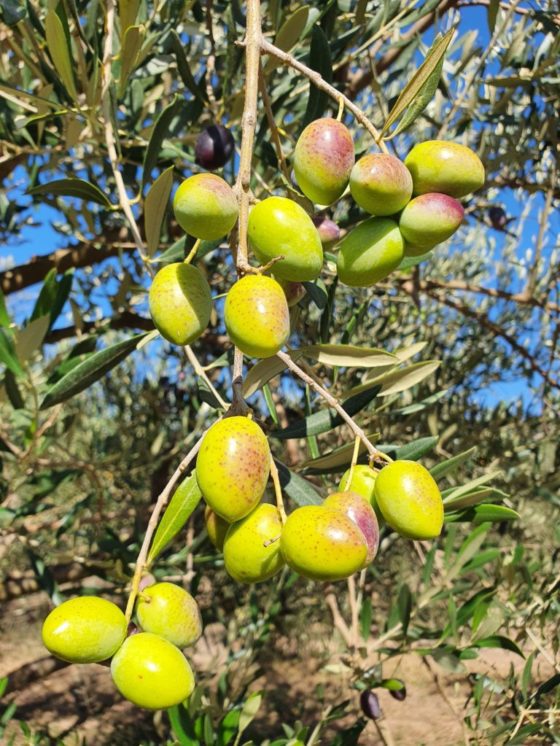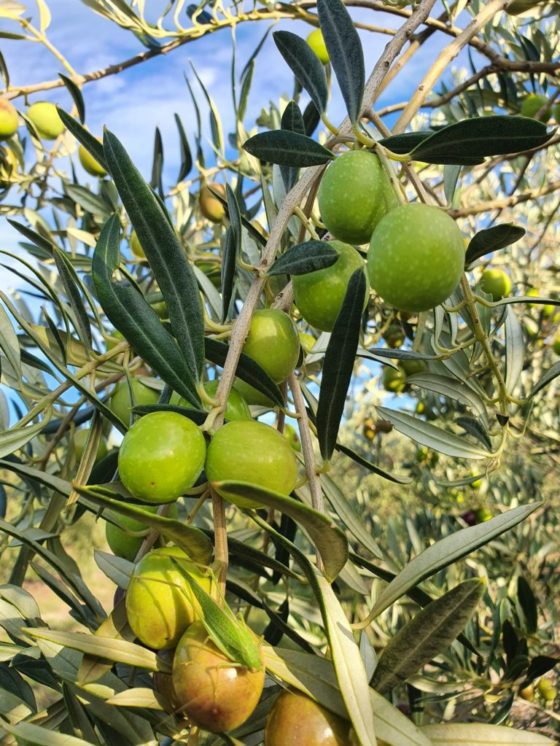
Un fruité noir en Provence, c’est le goût d’antan.
C’est le goût des nos anciens. C’est surtout le goût de l’époque où les mouliniers n’arrivaient pas à triturer toutes les olives récoltées dans la même journée. Ils n’en avaient pas les capacités techniques. Alors, ils stockaient les olives en attendant de pouvoir les passer à la presse. Ce temps d’attente faisait chauffer les olives entassées qui perdaient leur eau et leur amertume. Le résultat était des olives fripées, en fermentation.
Aujourd’hui les producteurs et moulins produisent encore du fruité noir, mais de manière maîtrisée, et non pas par défaut de faire autrement. Les olives destinées à être transformées en fruité noir sont misent dans des paloxs fermés hermétiquement à l’air le jour de leur récolte afin de les faire monter en température et pour démarrer le processus de fermentation qui désamérise les olives. Le degré de fermentation est contrôlé avec un thermomètre pour pouvoir stopper le processus et triturer les olives dès lors que l’on a atteint le niveau de fermentation souhaité. Une fois, ce processus la finit, les olives sont triturées.
L’huile produite avec de telles olives est très douce, sans amertume, sans ardence et avec des arômes de sous-bois et d’olive noire, beurre cacao.
Le fruité vert, c’est la fraîcheur et l’ardence!
Ce sont les olives récoltées en début saison, vertes ou tournantes, et, pour obtenir un bon fruité vert, les olives sont triturées le jour même de la récolte. Elles n’attendent pas ! Ceci est désormais possible avec les moyens de trituration modernes à notre disposition (chaîne en continu qui empêche tout contact avec l’air, des moulins à grande capacité de trituration) Cela donne une huile avec des saveurs d’herbe fraîche, plant de tomate, basilic, artichaut cru.
Les différentes variétés d’olives utilisées vont donner à cette huile leur typicité : artichaut cru et note poivrée pour la variété Aglandau, douceur, amandes fraîches et pomme pour la Salonènque, ardence et arômes herbacés pour la Picholine etc…. Ainsi le goût final du fruité vert va dépendre des variétés d’olives utilisées et leur pourcentage dans l’assemblage du produit fini.

L’huile d’olive vierge extra se conserve aisément jusqu’à 18 mois sans altération de la qualité ni du goût si quelques règles simples sont respectées.
L’huile d’olive doit être conservée dans un endroit frais (mais pas froid) à l’abri de la lumière. Si l’huile est trop froide elle devient laiteuse et épaisse. Il suffit de la ramener lentement à une température ambiante, son goût n’en sera pas altéré. Le contact avec l’air est à éviter absolument car l’huile peut devenir rance très rapidement. Il convient de bien refermer les bouteilles après utilisation, et de transvaser l’huile contenue dans les bidons dans des bouteilles dès que possible. Il se peut qu’un dépôt se forme au fond de la bouteille: ceci est normal et naturel et ne nuit aucunement au goût de l’huile.
L’extraction de l’huile
N’ayant pas de moulin sur place au domaine nos olives sont apportées dans un moulin privé le jour même de la récolte. Cela signifie que notre huile exclusivement faite avec nos olives. L’huile est extraite par centrifugation sous chaîne continue qui a l’avantage d’éviter toute altération du produit au contact de l’air. L’huile ainsi produite est ensuite mise en bouteille par nos soins sur notre exploitation.
Les variétés d’olives
Nous cultivons sept variétés d’olivier différentes dont l’Aglandau et la Salonènque qui sont les principales variétés de notre région et qui constituent la base de notre huile AOC Aix en Provence. Les autres variétés sont : la Picholine, la Tanche, le Cayon, la Grossane et la Manzanille qui nous permettent de créer des assemblages d’huile uniques. Chaque variété nous donne des arômes et des saveurs particuliers: notre métier c’est de les marier ensemble pour les sublimer.
![20221014_163638[1] 20221014_163638[1]](https://mas-seneguier.fr/wp-content/uploads/2022/12/20221014_1636381-768x1024-270x346.jpg)
L’assemblage de l’AOP Aix en Provence
L’assemblage de l’AOP s’effectue en famille, après une dégustation de l’huile de chaque variété d’olive, pour créer une huile équilibrée et harmonieuse à base d’Aglandau, Salonènque et de Picholine qui libère ses arômes progressivement et qui reste longue en bouche.
L’Appellation d’Origine Protégée : l’origine avant tout
L’Appellation d’Origine Protégée (AOP) reconnaît le lien existant et historique entre un produit et son terroir (entendu au sens large : sol, climat, savoir-faire…). Elle est la garantie d’une huile d’olive vierge extra unique, typique et d’origine certifiée. L’huile d’olive vierge extra est obtenue à partir de l’olive par des procédés exclusivement n’entraînant aucune altération du produit. C’est le jus de l’olive.
